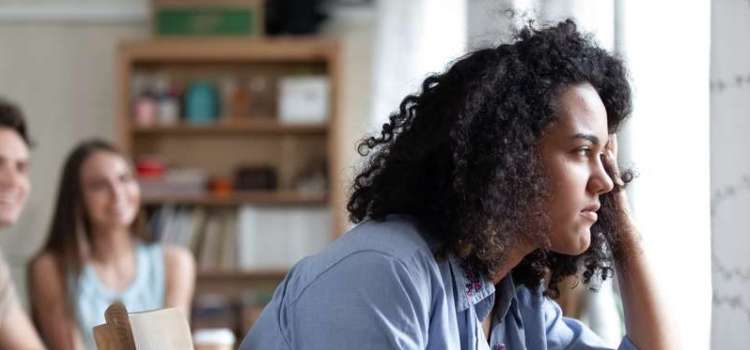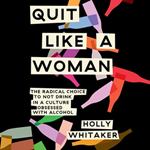Privilege Lurks at the Heart of Recovery Movements

If we aren’t talking about the way the system works, and who gets crushed by the system, we aren’t actually talking about recovery.
By Olivia Pennelle
Published on December 23, 2019 on The Fix
Making blanket statements that “anyone can recover” whitewashes and overlooks the gross inequities that people of color and marginalized communities face.
Recovery is possible for anyone, but it isn’t the reality for everyone. We may see an increasing number of people on social media proudly displaying their recovery as badges of honor – which in turn reduces stigma about addiction and a life in recovery – but it doesn’t accurately depict the true picture that recovery isn’t accessible to everyone, it heavily depends on your privilege.
Recovering “out loud” has gained so much momentum that it’s now a social justice movement: we are now questioning advertisers who normalize the excessive use of alcohol, challenging the use of biased language, highlighting the inequity in authorities tackling opioids but overlooking alcohol as the leading cause of drug-related deaths, and advocating for policy changes that affect people with substance use disorders.
While this recovery activism should be celebrated, we are still overlooking the inconvenient truth lurking beneath the surface: recovery is, unfortunately, still a privilege. Can we really be part of a social justice movement if we overlook the role privilege plays in the accessibility of recovery?
The Role of Privilege in Substance Use Disorders and Recovery
Many people within the recovery movement believe that recovery is possible in spite of race, ethnicity, economic circumstances, nationality, sex, gender, access to health insurance, and a strong support system – in other words, privilege. This simply isn’t the reality. There are great disparities both in how addiction affects people and how much recovery capital is available to us based on privilege.
Rates of addiction are higher in oppressed populations, especially among LGBTQ people and people of color. Black women over 45 are the fastest growing population with alcohol use disorder, and the risk of developing a substance use disorders is 20-30 percent higher for individuals who identify as LGBTQ+.
We don’t hear about those statistics, though; we see an opioid epidemic that is largely affecting white people. When drugs have a detrimental impact on communities of color, the media is less interested in covering it. Advocate Shari Hampton explains “Nobody gave a damn when black lives were being ravaged by crack cocaine in the 80’s. Families were ripped apart; communities were literally destroyed. People were thrown in jail and some of them are still there.”
She continues, “I’ve witnessed grandparents raise grandchildren right up to their grave while their grown children suffered from a crack addiction or a jail sentence that is so ridiculously long, it might as well be life. But now we have an opioid epidemic. It’s affecting a different demographic. And now, now it’s a treatment issue. This is disparaging and discouraging, especially to the black and brown folks that have never been treated with even a remote sense of compassion compared to what we see today.”
This disparity continues in access to recovery. Recovery is vastly different for those who lack recovery capital – the resources that can be used to sustain recovery: financial security, education, health insurance, and a support system – which is heavily linked, again, to our privilege.

Not all people who speak openly about their addiction and recovery are blind to the reality of the effects of privilege.
In her recent book Strung Out, author Erin Khar unpacks the role of privilege in her own recovery: “Escaping addiction, and it truly does feel like an escape, requires protective layers of aftercare. I have been incredibly fortunate to have access to the support I’ve needed.”
She continues, “We don’t have a system in place that makes it simple or easy for people to get help or support. There are financial, social, and racial barriers to getting help. If we are going to see a real downshift in the opiate crisis, support is what is needed – not just from peers and family members, but also the medical community and government.”
Studies show that African American and Latinx individuals are far less likely than white people to complete outpatient and residential substance use disorder treatment.
The inequity is also in access to medication. NPR highlighted a recent study by Dr. Pooja Lagisetty, an assistant professor of medicine at the University of Michigan, who stated that “this epidemic over the last few years has been framed by many as a largely white epidemic, but we know now that’s not true.”
Lagisetty found that as overdose deaths rose between 2012 and 2015, so did though the number of medical visits where buprenorphine was prescribed. However, researchers found no increase in prescriptions for African Americans and other minorities. In fact, the study found that white populations are almost 35 times more likely to have a buprenorphine visit than African Americans even though death rates among people of color were rising faster than white people. Researchers also observed that these visits were paid for by cash (40 percent), or private insurance (35 percent) rather than with Medicaid (25 percent), suggesting inequalities in healthcare.
“We shouldn’t see differences this large, given that people of color have similar rates of opioid use disorder,” says Lagisetty. “As the number of Americans with opioid use disorder grows, we need to increase access to treatment for black and low-income populations, and be thoughtful about how we reach all those who could benefit from this treatment.”
People of color have less access to treatment not only due to socio-economic circumstances. There is also a disparity in how drug use is viewed in communities of color. Despite similar rates of drug use and sales, people of color are more likely than white people to be arrested and receive harsher punishments for drug-related offenses.
Khar reflects on the criminalization based on race: “Some might say it’s a miracle that I never got pulled over, never got caught with that briefcase of drugs. But I see it less as a miracle and more because I was a young woman with passing-white privilege in a Jetta.”
She continues, “I’ve thought about this often, that had my skin been darker, had I come from less privilege, I have no doubt that I would have been arrested early on. I’ve thought about how that would have changed the trajectory of my life, how early arrests may have kept me forever trapped in a cycle of incarceration. Our drug laws are undeniably skewed to keep people of color and people of less privilege imprisoned and enslaved. And I’ve always been aware of that.”
The true picture of addiction and recovery inequity are often ignored on social media because our privilege blinds us to these realities. But if we really want to create a social justice movement, we have to change how we relay what substance use disorders and recovery looks like for all.
Creating a More Impactful Social Justice Movement
Let me be clear: this article is not intended to shame anyone for their privilege; instead, I’m suggesting that we can’t ignore the true picture in favor of a prettier, more palatable version. Making blanket statements that “anyone can recover” whitewashes and overlooks the gross inequities that people of color and marginalized communities face.
Advocate Shari Hampton explains this discomfort that underlies many recovery advocacy conferences. “I went to a conference earlier in the year and the white fragility in the room was nauseating. I literally didn’t understand why even talking about inequality caused so much discomfort. Simply discussing the topic had white folk with pursed lips and clenched fists. White folks can’t bear to examine a system that has entitled them to more, as being broken. It’s like admitting that Jesus was black. It’s not going to happen. To do so would disrupt all things.”
When asked how we can make a difference, Hampton responds: “America’s history teaches that black people are inferior to white people – that we don’t deserve the same treatment or opportunities. The mindset must shift. Because until we are seen, truly seen as magnificent beings, equal and worthy of the same quality of life and opportunities afforded to whites, very little will change.”
If we really want to create a more impactful social justice movement, we need to get uncomfortable. We need to be more mindful in our social media posts and consider if what we are portraying is an accurate representation of recovery, and question if our privilege played a role in our access to resources. We need to consider if we are amplifying the voices of those marginalized and oppressed. If not, why not? And in creating events to address addiction, or in going to Washington, DC seeking policy changes, we need to stop and ask ourselves if we have invited the people who are most affected by these policies. If not, we need to ask ourselves why we aren’t amplifying the voices of the people who most need to be heard?
 We cannot divorce recovery from true social justice. Writer and sobriety coach Holly Whitaker says: “For those people who don’t want to ‘dirty up’ or confuse recovery spaces with talk of racism, classism, transphobia, homophobia, ableism, classism, etc. – remember that recovery is about awareness, and that this path is about inclusion, love, and acknowledging wrongs and injustices.
We cannot divorce recovery from true social justice. Writer and sobriety coach Holly Whitaker says: “For those people who don’t want to ‘dirty up’ or confuse recovery spaces with talk of racism, classism, transphobia, homophobia, ableism, classism, etc. – remember that recovery is about awareness, and that this path is about inclusion, love, and acknowledging wrongs and injustices.
If we aren’t talking about the way the system works, and who gets crushed by the system, we aren’t actually talking about recovery. We’re still just talking about our comfort zones, and using our privilege to deny other experiences.”
Located in Portland, OR, Olivia Pennelle (Liv) is an experienced writer, journalist, and coach. Liv is passionate about challenging limiting mentalities and empowering others to direct their own lives, health, and recovery. Liv also co-hosts a podcast, which you can listen to here: Breaking Free.
Another article by Olivia was re-posted on AA Agnostica here: 8 Essential Books on Addiction and Recovery.


























Need a sponsor.
Hey Samaris. Find online meetings near where you live. Share with them that you need a sponsor. It is MUCH better, I think, to have a face-to-face relationship with a sponsor than at a distance. Don’t give up!
I agree wholeheartedly with you Olivia, I am an alcoholic white working class citizen of the UK and know from my experience in life, and as a former substance misuse clinician with 17 years experience in mental health work, that there is a direct correlation between economic circumstances and vulnerability to addiction. A person who tries booze, heroin or whatever is less likely to keep at it and descend into addiction if their life is ok! If not ok then substances provide escape, which is often great at first. Class is often overlooked when considering addiction, deprived white working class areas in the UK are rife with addiction as I suspect they are in the US. Of course if you’re non white and working class things are more difficult, the addiction services are often culturally ignorant and run mainly by whites. So let us not overlook that poverty in general is a causal link to addiction, regardless of race – being non-white reinforces that link.
A potent and superb article. I have witnessed the phenomenon of white privilege and the ensuing discomfort among the rank and file at AA meetings when issues of inequality are brought up. I’m often one of the folks bringing them up. I would add that the role of paternalism is embedded as deeply in AA as it is in society at large if not deeper. I strongly suspect that paternalism is one of the forces that enables a range of attitudes that keep all forms of inequality alive and well in both 12 step societies and society at large. These inequalities are truly embedded at the institutional level. Thank you for the powerful article!!!
In the US, buprenorphine treatment costs money – a lot. Methadone costs less. One need only go the a MM clinic at 8am and look at the clients to see the differences – many more minorities than at the private physicians’ offices. This specific problem is economic, but in general, access to money is more restricted for minorities than for whites. So recovery is just another example of the racial/ethnic economic disparity in the US, especially as it is reflected in the health field. It is beyond sad. It is unconscionable. One need only look at the disparity in longevity. Or, a horrific new example; the disparity in outcome of COVID-19 infection.
My home group is Red Road, a Native American group. We are not on the reservation which makes it somewhat easier as it seems at times that there is little emotional or social support on the rez. We also recognize that AA is often a foreign culture to many of us. Our meetings take a traditional talking circle format with lots of smudging.
I find that the sexist, homophobic, and racist comments that I hear in regular AA meetings push me away from the meetings.
My home group is one of the poorest in the city and no one turns anyone away who respectfully wants to participate. There was no privilege in the detox unit downtown that saved me, and whoever wanted to go to rehab after did so, including the homeless. Anyone who wants help can get it.
Where I sit, I see all kinds of people struggle with addiction. The common traits of the successful, as well as those who don’t succeed, are not their race, gender, or sexual orientation. We have every combination of those and it doesn’t seem to matter to any of us.
Yes, Jesus wasn’t black. He wasn’t white, either. He was an Arab. People choose to see and believe what they want, regardless of facts. The problem with faith, or any belief based on preference or desire, is that it is not interested in the truth. That is dangerous and it usually comes with an agenda.
We all are unequal. Like it or not, nothing is going to change that significantly. You don’t want to be equal either. To be equal, we all will have to give up something, and that includes those who have “less” than others. Those giving up things would also include you, and you might not like what you have to give up.
Time is better spent on improving the things you can, starting with yourself and for those who you love and who love you back. That couldn’t be more true in recovery and that opportunity is everywhere.
Just great, and informative. I hope discussions of these topics become more widespread.
BRAVO !~!~! BRAVO !~!~! BRAVO !~!~!
A most excellent article indeed. Thanks Liv for writing it and Roger for posting it.
In addition to the many excellent points in the article, let me also point out that AA’s co-founders were not only privileged but could also be considered by some to be elitist — Bill Wilson was a Wall Street banker, for goodness sakes, and Dr. Bob was a proctologist. Now don’t get me wrong, I attend weekly AA meetings, and I’m most grateful for having gotten sober in New York Freakin’ City AA in late 1972. I am also exceedingly grateful that many meetings then were more akin to our current secular meetings in AA than they were to the Bible and Big Book thumping meetings in southern Arizona where I currently live and in Mississippi where I grew up, escaping first to Cincinnati, followed by Washington, DC and then New York City in 1972. BTW, I went to New York City to seek employment in the theatre; instead I got sober, most definitely an excellent good deal . . .
BTW, Liv, my former wife, Jill, and I were co-founders of the 10:00 am Sunday morning Secular Meeting at the Alano Club. I hope to travel to Portland later this year, depending on the state of the pandemic with which we are currently challenged. If not this year, then definitely next year. I’d welcome the opportunity to meet with you for a cup of coffee, if you have time.
Historically AA has been more accessible to white males of a certain social standing, than anyone else. Late 1930s and 40s, women and African Americans were not allowed in AA meetings, and those who identified with a drug problem other than alcohol were turned away as well. But history also shows that AA as a fellowship has made great strides to be more inclusive and accessible today. Even Bill Wilson himself changed his attitudes towards nonbelievers and drug addicts later in his life, which he writes about in the AA Grapevine, and we look at Tradition 3 which states “the only requirement for AA membership is a desire to stop drinking” it’s in black and white.
I serve as the Accessibilities Co-Chair for my district in South Florida. In my time serving this commitment I have not seen any accessibility issues based on race, sexual identity, or low income. Usually the only accessibility issue or thing getting in their way is the individual themselves. I will say that there may be a geographical privilege, because South Florida has a very large recovery community composed of many different 12 step programs and treatment centers. However for those in remote communities, they have to go to any length for their sobriety, by going to physical meetings that are scarce or resorting to online meetings.
The accessibility issue that does concern me, that is very real, and very much ignored (especially by this article, it seems) is the barriers that face alcoholics that are deaf, hard of hearing, blind, physical disabled, suffering mental trauma, or have difficulty reading and processing information. But not many people are willing to pass around a basket for an ASL interpreter, in fact many people don’t even think about it. I have recently inquired GSO in New York about translating Living Sober into ASL, mainly because it tends to be more secular and uses gender neutral language, something which I believes reaches more newcomers than the Big Book or the 12&12.
It’s very easy to point the finger and state all the things that are wrong with “the system” and not provide solutions. In meetings we are supposed to focus on the solution, not only the problem. Stating that “yes I am privileged and I am part of the problem”, doesn’t actually help anything, it just makes the person admitting that they are part of the problem feel good about themselves. Let’s talk solution, and then let’s take action.
You are just denying her point, blowing it off. Because, just as she writes, it’s an inconvenient truth. It means the system of AA is inherently flawed, and since you’ve built your life around it, you cannot accept it. I think ignoring the role privilege plays in recovery is Why the success rate for your program is low. Interesting about the physically underprivileged you mention, but since it’s beside her point of the socially underprivileged, you just changed the topic in order to stay in your comfort zone. The funny thing about being socially privileged: it’s like you have blinders on to the underprivileged around you. So, no, if you are white and male, I am sure you do not see how racism, xenophobia, homophobia and sexism are barriers to recovery. And, I see that you do not want to see. So you never will. Keep those blinders on closed.
Well, it’s a little presumptuous to assume I’m white and male. I am male, but I’m latino.
It’s important to note that in this article, Olivia talks about the system in recovery, to me that seems very broad. Recovery can include AA, NA, CODA, Smart Recovery, Refugee Recovery, Celebrate Recovery, any 12 step program, and many more avenues in which people seek recovery, and achieve recovery successfully.
I agree there are many things we can do better to provide more access to recovery and treatment for communities and groups of people that statistically have higher rates of addiction. But these are outside issues, and AA has no opinion on outside issues. Sometimes I don’t agree with that statement, but I understand the reason for it, and this website is AA Agnostica.
AA as a fellowship strives to be more inclusive. That doesn’t mean every single person in AA acts as inclusive as they should. We have plenty of bad apples in my opinion, we are all autonomous after all. In my area of Florida, we have Russian-speaking meetings, Spanish-speaking meetings, Agnostic/Secular meetings, LGBTQ meetings, and MEN and WOMEN meetings to name a few. Doesn’t seem very exclusive to me, sadly we have no ASL meetings.
Yes, AA saved my life and holds a special place in my heart, but I sure as hell raise my hand in a meeting when someone tells a newcomer they are not welcomed cause they are not a certain race, gender, sexual preference, or have low to no income. Not that I have personally seen that, If I did I would be disgusted.
I’m an atheist. In my opinion agnosticism and atheism are accessibility issues in AA. “Can’t get sober without God, the God as I understand Him”. I’ve had my fair share of people tell me that. All the other things about me; hispanic, veteran, male, sexual identity go out the window, when I state my lack of belief. Is that privilege?
I take what I like and leave the rest. Leave and remove those bad apples from your life who say that you can’t recover in AA, and if need be, go to another fellowship or program. AA does not have a monopoly on recovery. There are many other options that have worked for people. This is one works for me, but I’m very aware that it won’t work for everyone.
OH MAN. Thank you so much for this article!!! SO IMPORTANT!!!